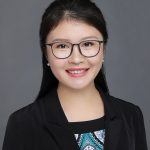

Kaley Clements is an Assistant Professor of Documentary Arts with expertise in filmmaking, photography, visual narratives, aural storytelling, and soundscape design. He received an MFA in Experimental and Documentary Arts from Duke University. His research focuses on where social conflict, climate change, and the loss of diversification converge under the power structures of the globalizing economy. His current project is a documentary film that follows the flow of the Mekong River from its origins in China all the way through six countries until the river spills into the Pacific Ocean in Vietnam's Mekong River Delta. The film focuses on sediment flow and the commoditization of sand. The Mekong River Delta is an agricultural rich region that is responsible for 75 percent of Vietnam’s annual rice production and more than half of their total aquaculture. Unfortunately, various forms of urban development are threatening this crucial part of Vietnam’s food supply.

Cici Cheng is a Chinese-born U.S. artist and photographer who grew up in Durham, North Carolina. She received an MFA in Experimental and Documentary Arts from Duke University and currently teaches Media and Arts at Duke Kunshan University. Her work focuses on personal and observational methods to tell stories that center around intergenerational family relationships, the connection between place and identity, and the process of cultural assimilation. Her current project aims to capture the lives of Asian American small business owners and the enormous impact of family dynamics through generations, as well as explore how each generation grapples with the delicate balance between tradition and assimilation. Another ongoing project involves the investigation and documentation of the current state of cities and the businesses that depend on shoe manufacturing for both domestic and foreign markets. The intricate intersection of economics, culture, and the people within these communities is also examined in this project.

Dr. Binbin Li is an Assistant Professor of Environmental Sciences at Duke Kunshan University. She holds a secondary appointment with Nicholas School of the Environment at Duke University. Her research focuses on loss of biodiversity, endangered and endemic species conservation such as giant pandas, priority setting and management of protected areas, and promotion of innovative technology, markets and policies to solve conservation problems and local community development. Dr. Li’s work covers the identification of conservation priorities and national parks in China, impacts of One Belt One Road on biodiversity, giant panda conservation and management via Footprint Identification Technique (FIT), impacts of oil palm and rubber plantations on biodiversity in Southeast Asia, influence of national environmental policies on human-wildlife conflicts, and behavioral study of endemic species. She is also a member of the IUCN SSC Small Mammal Specialist Group.

Dr. Joseph Giacomelli is an Assistant Professor of Environmental History at Duke Kunshan University. His research examines how environmental and scientific knowledge is created, contested, and sometimes transformed into actions that shape people's lives. He is especially interested in climate history, environmental history, and the history of science. His book, Uncertain Climes: Debating Climate Change in Gilded Age America (University of Chicago Press, 2023), focuses on the political and cultural dimensions of late nineteenth-century climate change theories. In the book, he argues that contentious debates about human-induced climatic changes shaped not just environmental and scientific thought, but also broader political struggles over the future of expansionism and capitalism.He has produced work in Saudi Arabia, Cuba, Mexico, Vietnam and the U.S. His work has been screened internationally and he has curated film exhibitions in Shanghai.
Jiawen Cai, Cluster Coordinator
Annie Tong, Student Assistant